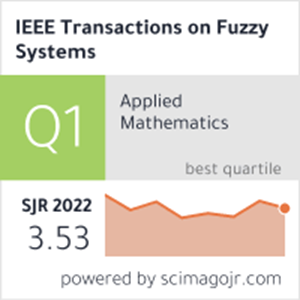Affective Evaluation Based on Gamified Experience and Cascaded Fuzzy Reasoning for Wrist Rehabilitation
IF 11.9
1区 计算机科学
Q1 COMPUTER SCIENCE, ARTIFICIAL INTELLIGENCE
引用次数: 0
Abstract
In order to establish the link between rehabilitation experience and patients’ emotional feedback to assist decision making in a wrist rehabilitation program, this article integrates a gamified experience and proposes an affective evaluation method based on cascaded fuzzy reasoning. Primarily, gamified interactive tasks are developed for wrist rehabilitation training, and the prototype of a rehabilitation interactive system is built to collect multidimensional physiological signals (MPSs). Subsequently, with the MPS as input and arousal valence (AV) as output, fuzzy reasoning rule I is defined to establish the MPS-AV model and calculate the value of AV. Besides, with AV as input and emotion label (EL) as output, fuzzy reasoning rule II is defined to establish the AV-EL model and visually analyze the emotional state of patients. Finally, the task completion rate of rehabilitation interaction behavior is calculated based on behavior coding, and the effectiveness of the proposed affective evaluation method is verified by integrating subjective evaluation. The gamified rehabilitation experience and the affective evaluation method based on cascaded fuzzy reasoning provide methods and experiences for wrist-rehabilitation-related products and services, and this protocol can also be generalized in the field of rehabilitation digital therapy.基于游戏化经验和级联模糊推理的腕部康复情感评价
为了建立康复体验与患者情绪反馈之间的联系,以辅助腕关节康复项目的决策,本文整合游戏化体验,提出一种基于级联模糊推理的情感评价方法。首先,针对腕部康复训练,开发了游戏化交互任务,构建了用于采集多维生理信号(mps)的康复交互系统原型。随后,以MPS为输入,唤醒价(AV)为输出,定义模糊推理规则I,建立MPS-AV模型,计算AV值。以AV为输入,情绪标签(EL)为输出,定义模糊推理规则II,建立AV-EL模型,直观分析患者的情绪状态。最后,基于行为编码计算康复互动行为的任务完成率,并结合主观评价验证所提出的情感评价方法的有效性。游戏化康复体验和基于级联模糊推理的情感评价方法为腕关节康复相关产品和服务提供了方法和经验,该方案也可推广到康复数字治疗领域。
本文章由计算机程序翻译,如有差异,请以英文原文为准。
求助全文
约1分钟内获得全文
求助全文
来源期刊

IEEE Transactions on Fuzzy Systems
工程技术-工程:电子与电气
CiteScore
20.50
自引率
13.40%
发文量
517
审稿时长
3.0 months
期刊介绍:
The IEEE Transactions on Fuzzy Systems is a scholarly journal that focuses on the theory, design, and application of fuzzy systems. It aims to publish high-quality technical papers that contribute significant technical knowledge and exploratory developments in the field of fuzzy systems. The journal particularly emphasizes engineering systems and scientific applications. In addition to research articles, the Transactions also includes a letters section featuring current information, comments, and rebuttals related to published papers.
 求助内容:
求助内容: 应助结果提醒方式:
应助结果提醒方式:


